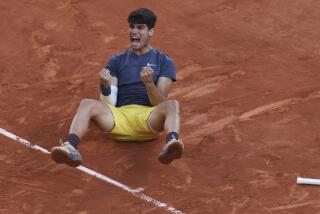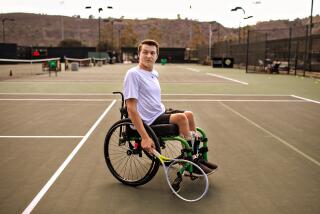French Open : Instead of Lendl, Wilander Wins It Again
- Share via
PARIS — Mats Wilander, a nerveless, relentless 20-year-old Swede, picked apart defending champion Ivan Lendl in Roland Garros Stadium here Sunday to win the men’s championship in the French Open for the second time.
The score--3-6, 6-4, 6-2, 6-2--was no indication of Wilander’s mastery over the 25-year-old Czech.
His triumph was an upset of sorts, since he was seeded fourth and Lendl second, but it was not one of monumental proportions. By racing through his six preceding opponents, including a 6-1, 7-5, 7-5 demolition of No. 1-seeded John McEnroe in Friday’s semifinal, Wilander gave sufficient notice that nothing he might accomplish in this tournament would be a surprise.
Wilander won by exerting uncompromising pressure on Lendl, who a year ago had taken this championship with a dramatic five-set victory over McEnroe, ranked by all rating systems as the world’s best player.
Lendl won here in 1984 by capturing the last three sets after being down two. But, against Wilander, once Lendl got behind the surging young Swede, there was no coming back no matter what strategy the stony-faced Czech tried.
Wilander, who also won here in 1982, pressured Lendl into error after error by resorting to a tactic not commonly associated with his game in the past. He repeatedly attacked the net, not necessarily serving and volleying, but by moving in whenever his approach shots provided the opportunity.
“I’ve worked hard on my volley and I felt I could control him by coming to the net,” Wilander said in a post-match interview. “I think he felt the pressure. He was starting to hit short, and I was getting more comfortable after the first set.”
By the third set, when the Swede’s dominance became complete, Wilander said: “I was feeling pumped up and I felt he was fading away.”
Lendl said later he was not surprised at Wilander’s unaccustomed aggression. But even though he had been expecting it, he said Wilander’s spirited play unhinged his own game. “I knew he would come in,” Lendl said. “But he just surprised me at how well he was hitting at the net and he just kept picking up momentum.”
Lendl appeared much the stronger of the two at the outset of the match, even though Wilander, who in 1982 at the age of 17 became the youngest man ever to win this Grand Slam event, took the first three games.
Lendl’s powerful serve initially found its mark and pulled Wilander into awkward positions repeatedly, even though the Czech served no aces in winning the first set by reeling off the last six straight games.
“I did not feel very comfortable then,” Wilander said. Nor did most spectators sense what lay ahead even when Wilander took the second set which was distinguished chiefly by the kind of play common to the red clay of the stadium court--long, mind-dulling rallies. But to Wilander winning the second set was a harbinger of what lay ahead.
Wilander said that the occasional times he came to the net during that set provided him with the confidence that he needed to persist with the tactic. “When I won that second set, I knew it was very important because I was becoming more aggressive,” he said. “I was pumping myself up.”
The second set also saw Lendl’s normally effective service desert him. And by the third set, Lendl’s confidence was leaky at best.
Even though he got his first ace of the match in the fifth game of that set, he could not pull out the game itself. Wilander broke Lendl when he returned a Lendl service, and Lendl dumped an easy shot into the net. A bewildered look came over the Czech’s normally immobile features and he appeared shaken.
After that, Wilander broke Lendl time and again. As the latter noted after the match, he went one stretch in the third and fourth sets during which he lost six out of seven of his service games. “He started returning better and better and maybe I was just pressing too hard,” said Lendl of the collapse of his serve as a weapon.
In the seventh game of the third set, Lendl started with his second ace and it appeared, briefly, that he might turn the match around. But Wilander continued his streak of breaks with two crunching winners at the net. When Wilander held his own serve and closed out the set, the Parisian crowd, which had made him, the underdog, the favorite, chanted in anticipation of an upset which appeared to be in the making. The match then was an 1 hour 40 minutes old.
By the beginning of the fourth set, Lendl was barely hanging on but won the first game when his service made a sudden reappearance. But after that there was no denying the tenacious young Swede.
He held his own serve and then broke Lendl at love. After that, it was just a matter of Wilander’s running out the string as Lendl repeatedly pushed weak shots into the net. Wilander won the final set in half an hour when Lendl pushed a weak backhand service return into the net.
The match was played on a blustery, sometimes showery, June afternoon. The winds often stirred up dust devils so fierce the players found it necessary to shield their eyes.
Lendl refused to blame the wind for his defeat, but he did say it prevented him from hitting his shots as deep as he would have liked.
While both McEnroe and Jimmy Connors, who was crushed by Lendl on Friday, both made the semifinals, the tournament represented another significant failure for American men on the red shale of Roland Garros.
Not since Tony Trabert of Cincinnati, Ohio, but now of Los Angeles, won back-to-back championships here in 1954 and 1955, has an American male won in Paris.
More to Read
Go beyond the scoreboard
Get the latest on L.A.'s teams in the daily Sports Report newsletter.
You may occasionally receive promotional content from the Los Angeles Times.










